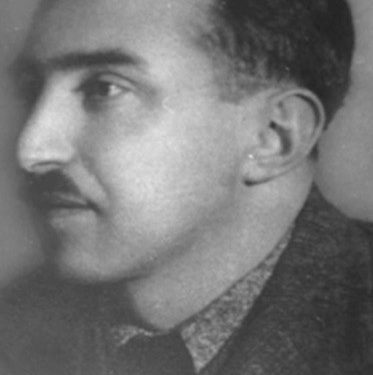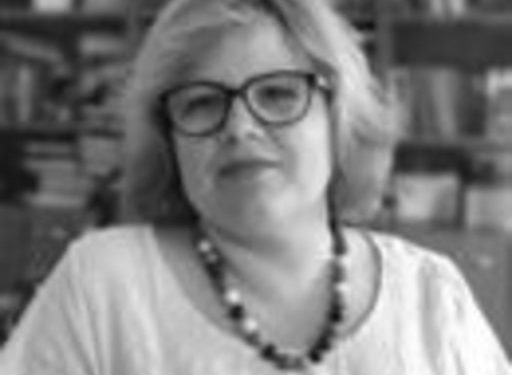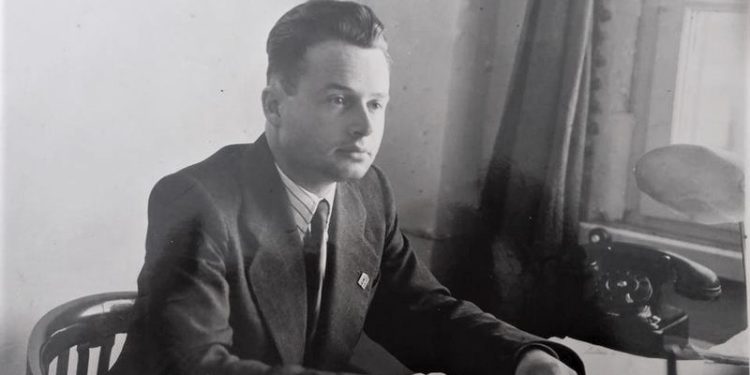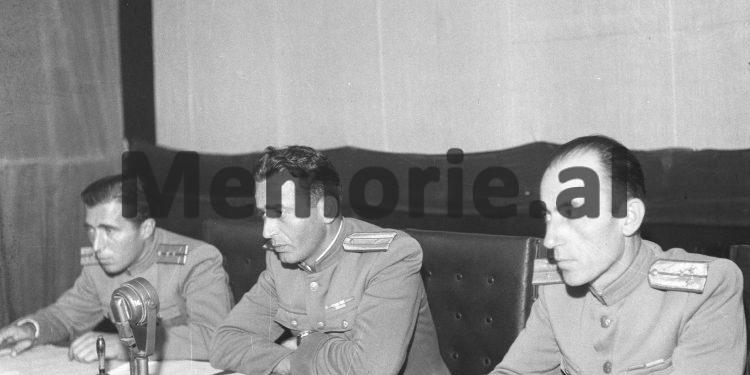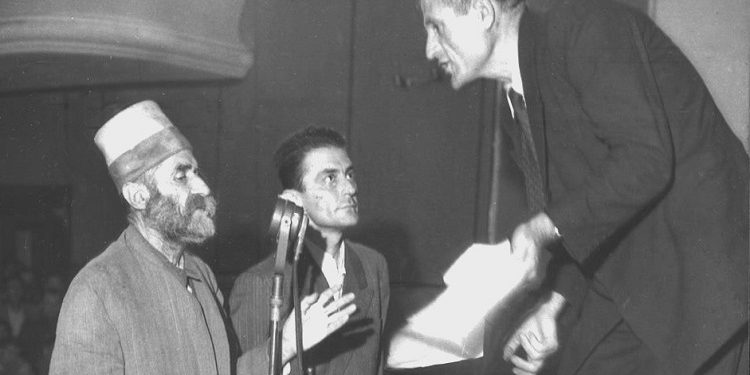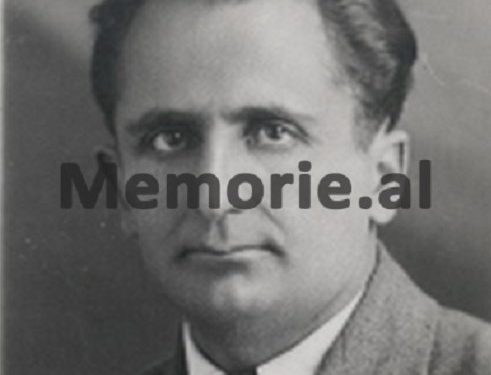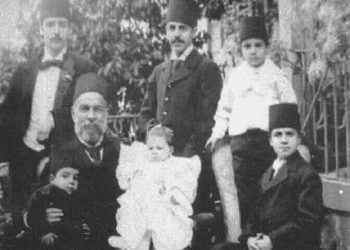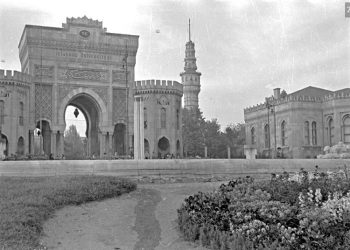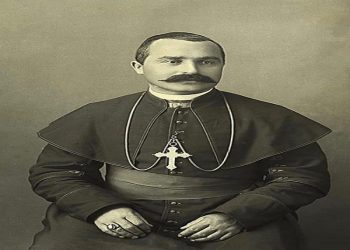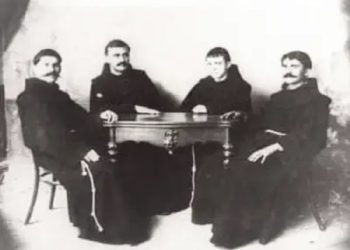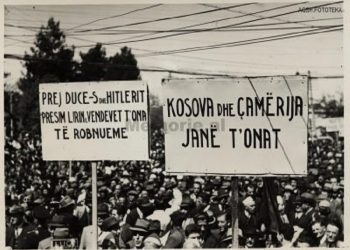By Fatmira Nikolli
Memorie.al / In 1943, when Tirana has changed two invaders in five years, Gjergj Kokoshi joins the National Liberation Front. He is 39 years old. From Shkodra, where he was born in 1904, he left to study in Italy and France, for Philosophy, he obtained a doctorate in Paris for Literature and in the 1930s, he returned to become a professor at the state high school in Shkodra and Tirana. The circumstances and the slow surrender of Albania, from the Italian influence in the fascist occupation, but also the opposition to the King’s policies, have made him anti-Zogist. But also, anti-fascist. So much so that in 1940, when he was invited to participate in the First Conference of Albanian Studies, which marked the establishment of the Royal Institute of Studies, he refused for health reasons.
When the war had begun, Kokoshi had demonstrated affiliation with the partisans and the Movement led by the Communist Party. After propagandizing anti-fascist ideas and spreading them to young people in schools, the professor left the classroom and became part of the armed resistance against the occupier in the north of Albania, in Dibër, reaching the rank of colonel.
His name began to become known after the Përmet Congress in May 1944, when the installation of the communist regime in Albania began. The philosopher, also graduated in Literature, was elected a member of the National Liberation Anti-Fascist General Council, a governing structure at that time.
Historian Enriketa Pandelejmoni, on whose study this article is based, says that he must have been proposed as the person in charge of education during the days of the Congress in May, since his name is found in an unsigned document, while officially, Kokoshi was uploaded on June 20, 1944. Enver Hoxha presented him with great praise, as a participant of the Movement “a man who has not made compromises and competent with experience in the field of education”. Four months later, at the meeting of the Council in Berat, Kokoshi was appointed Minister of Education in the provisional government headed by Hoxha.
However, as learned from the Form File of former MP Selaudin Toto, even during the War, Kokoshi was unhappy with the extreme left elements that were in power. Despite the situation, the former professor organizes the Congress of Anti-Fascist Educators and compiles the platform for education. It is the time when Kokoshi’s view on the qualitative development of education collides with Sejfulla Malëshova’s view on the massification of education.
There are also debates among them on the competences of the Ministry of Popular Culture, as well as on the low voice that was left to education in the 1945 budget, when previously 13% was reserved for it. Kokoshi begins to find himself out of the loop, as those who won the war were consolidating power. He believed that the National Liberation Movement was not one hundred percent of the extreme left. He knew that there were moderates in it, but the fact that the most extremists took power, he did not like, and even caused despair in many others.
After about 80 days as minister, beyond the clashes, the professor realized that he could not bring his vision to life. Gjergj Kokoshi resigned on January 13, 1945, while Malëshova was Minister of Culture and Propaganda and later Minister of Education. He continued to be a part of the National Liberation Council, which in August 1945 was called the Democratic Front, but he openly expressed his opposition to the new electoral law, which did not allow other parties to participate in the elections.
This happened when international allies, such as the USA and Great Britain, had set a condition for recognizing the government, holding free and democratic elections. In the local elections, the Communist Party listed its own people, “experienced in war, determined and loyal to the interests of the people”. He was already taking the leadership of the state into his own hands, having previously eliminated the “representatives of the reaction”. Gjergj Kokoshi ran in the local elections held in May 1945, in “Lagje e Re”, in Tirana, but could not be elected. He had received only 17 votes.
On September 27-29, two months before the central elections of December 2, 1945, a legal package was approved for them. The Electoral Law, the Law on the Constituent Assembly as well as the Law on Voters’ Lists limited the conduct of free elections. The Democratic Front, which was led by the communists, did not allow the creation of other political groups, the voting administration process, from commissions to supervisors, according to historian Sonila Boçi, was in their hands.
Dissatisfaction was great. Since the discussions on the drafting of the law, Gjergj Kokoshi, at that time Minister of Education, but also a member of the Council of the Anti-Fascist National-Liberation Front, had stated that it was not compatible with democratic principles. He openly opposed its approval, arguing that it undermined the establishment of a democratic and pluralistic order. He noted that in post-war conditions, the law did not allow educated and qualified people to contribute and did not give enough time to groups outside the Front to organize and present their candidacies.
He emphasized that this contradicted the principles of liberal democracy. Resigned from the post of minister, in the meetings of the Council, where he was still a part, Kokoshi insisted on pointing out the damage of the harsh economic policies, which according to him, could be justified for the war criminals, but no strict measures were taken. requisitioning property from their families, especially when the persons in question had died. He advised caution about the extraordinary tax on the profits of the War, because, as it was being done, it had become a nightmare for merchants.
Resigned and in conditions where his voice was not heard, while the measures taken had caused fear everywhere, Gjergj Kokoshi, decides to rethink his position within the Front and the possibility of leaving. He knew that the Front was spoken against in public, he knew that there was no freedom and that the country was in a dictatorship, so he saw himself in the elections, outside of their lists. For a long time, knowing his nature, other anti-communists had contacted him to organize with them, although he felt resentment, the way the elections were being held and the fear of running outside the Front.
Musine Kokalari’s social-democratic group was with him, but also the sympathizer of the monarchists, Qenan Dibra. All this was done in the conditions of a political terror, started with the “special courts” and “people’s courts” of March 1945, first against “war criminals”, and then against the anti-communists in the North.
Although the situation did not favor the political organizations against the government, international pressure, allowing foreign journalists in the campaign and in the polls, became an incentive for the non-communists to come up with their own lists in the elections.
With only two months to go, in the secret meetings it was understood that it would be difficult to secure the necessary signatures to announce the candidacies or the political group. Only 25-30 firms were gathered, quite insufficient. On November 17, 1945, the group emerged under the name “Democratic Union”, as a union of political currents with the aim of forming an opposition.
At this time, Kokoshi understands that it is necessary to draft a program and a prayer, signed by several “honest people with a correct political attitude”. The program was similar to that of the Democratic Front, so Kokoshi says that; it is against the policy of the Albanian government, which “wants to unite Albania with Yugoslavia”. For him, this union was against the will of the Albanian people, who; “he wants Albania to remain an independent and sovereign state, we must preserve such a state, but without Gjirokastër and without Korça, there is no Albanian state”.
Regarding the issue of Kosovo, unlike the others, he suggests leaving it aside for the moment; “since Yugoslavia helps us, to preserve the territorial integrity”. Researcher Enriketa Pandelejmoni, says that; “Gjergj Kokoshi had faith in the British and American missions in Albania and in their influence on the Albanian government, to put pressure on the elections and postpone them.
With naivety and to the surprise of the participants in the meeting, he says that the program and the prayer should have been sent to the Albanian government, after he had talked with the British General, Hodgson. Kokosh’s right logic, on the steps taken before the elections for a new political grouping, were done at the wrong time. He still didn’t understand.”
His proposal is met with skepticism by the participants in the meeting. They knew that if they informed the government about the formation of this party, they risked being arrested. But Kokoshi insisted, adding that the arrest should also be taken into account at the moment when they were creating an opposition party, such as the “Democratic Union”, which included the disaffected, monarchists and social democrats.
It was agreed that the leadership of the opposition should be left to Kokosh. The direction was entrusted to the professor, who knew the youth well in schools and gymnasiums and would be able to organize them. They saw him as the most suitable person, since he had been at the Front, had fought, had been a minister and was a well-known personality for the allies.
Gjergj Kokoshi himself was concerned with informing the Western Allies. They were informed about the formation of an opposition group, where representatives of several political trends were united, with a program and branches in the main cities of Albania. Kokoshi told the English, that; in case the elections were free, the opposition would win 20-30%, so they needed their support.
On November 20, it was decided to send a note to the international missions on the postponement of the elections, the democratic form of the regime after them and the possibility of returning King Zog to Albania, if the voters decided. In another meeting, a memorandum was drawn up, in which it was announced that the elections could not be held freely, because the people would vote for the (National Liberation) Front out of fear.
The memorandum of the opposition directed by Kokoshi, summarized what was happening in the country and what was the change they offered.
It was emphasized that the communists fought and promised a democratic system, so it did not occur to the young people that a communist regime was starting to be established in Albania. It was remembered that the Front did not allow the formation of another party, nor the separation from the Front.
“In both cases, they are accused of being saboteurs, fascists and reactionaries, the case of prof. Gjergj Kokoshi, the first Minister of Education in Enver Hoxha’s government clearly shows this”, the memorandum underlined, adding that in November 1945; “the three powers, the legislative, executive and judicial power, the separation of which guarantees a regime with political freedom, are in fact a mixture”. At the same time, it was informed that; “the four freedoms (of speech, religion, need and fear) have been trampled underfoot”.
They mentioned the brutal killings during the first days of the regime, the large army, the bloated administration, and it was pointed out that the Agrarian Law had made confiscations, leaving the owners so little land that they could not make a living. The opposition group stated that it was not an enemy of communism, but a political opponent, at a time when freedoms are violated by a despotic government. In its program, the opposition offered the immediate establishment of full political, religious and media freedom, protection before the law and before the trial, with elected judges.
The country’s membership in international organizations, friendly relations with allies and neighbors, territorial integrity, material and moral improvement of the living conditions of the working class, allowing workers and peasants in political life, etc. Since the memorandum was addressed to foreign missions in the country, the opposition wanted to tell the world the true situation of the country.
But when they handed over to the two English soldiers, Palmer and Arnott, in their Mission in Tirana, they received an answer that; “they were too late and there was little hope for postponing the elections, but anyway, they would hand it over to General Hodgson”.
Colonel Palmer and Major Arnott would later deny having made concrete promises to the opposition. They accepted that they had been given a program and a memorandum, which meant taking power democratically and peacefully, with free elections. But the memorandum required that if a large number of them were to be arrested, then the British should support them. Major Arnott, admitted to frequent meetings with the opposition group, but stated that their plans had seemed weak, that they were ineffective, divided and had not given him confidence, that they would maintain the confidentiality of the conversations with him.
The Democratic Union threw the idea of an uprising against the communist regime and a demonstration before the elections, on November 28, ’45, for the Independence Day. He even prepared an appeal for the people. The demonstration was not held, due to the fear of surveillance. Only tracts against the government were thrown. Foreign missions did not intervene with the Albanian government to postpone the elections.
The disappointment and bitterness was great. Musine Kokalari, secretly confessed to his nephew, in 1972, that; “The Allies did not interfere with the government and remained silent on an issue which, logically, turned out to be inevitable for the punishment of the signatories. One by one the signatories were arrested, with the accusation; to overthrow the government. The consequences for all these people are simply imaginable.”
The future was fatal for the “Democratic Union”, which meanwhile was monitored by the structures of the People’s Protection Section (predecessor of the State Security). Four informants and his collaborators were placed within the opposition. The blow was imminent. In the first ten days of 1946, the arrests began. Gjergj Kokoshi and Musine Kokalari were among the first to be arrested, but in total, 37 people were put in the cells.
The trial against them started 6 months later in Tirana. It was June 17, 1946. In the “National” Cinema, in the presence of a “chosen” people and local journalists, the trial lasted 15 days and was broadcast on the radio, so that people could hear it in every part of Albania. They were before the Supreme Military Court. They accused him of; “were gathered to violently overthrow the people’s power, to cause an intervention of foreign imperialists, to commit suicide and to carry out assassinations against the leaders”.
Gjergj Kokoshi, who had also considered the arrest, was accused of; “had instructed and inspired to attract as many elements as possible; he was accused of having taught them to compile notes for the foreign mission and of having used the place, name and credit that the Front had given him, to sabotage and overthrow the government”.
The professor, graduated in Philosophy and Literature, former colonel, former minister and former leader of the opposition, decides to keep a word in his defense. The word itself is missing from the court documents, but it has reached today, his phrase that affirmed that; “the communist government did not represent the will of the people”, so he had joined the opposition. Knowing that the trial was in vain, he decides not to speak anymore and simply asks that; “which was contrary to the state laws in force”!
On July 2, 1946, sentences were given for 37 people, of which 8 were shot and the others were sentenced to; 2 to 30 years of political imprisonment. Security informants were given minimal sentences, or acquitted. Kokoshi is sentenced to 30 years in prison, forced labor, loss of civil and political rights and confiscation of property. After six months in Tirana, he was sent to the High Security Prison in Burrel.
The opposition led by the “Democratic Union” failed to appear in the elections of December 2, 1945, and its members were arrested everywhere. His sentence was to end on January 23, 1976, but he died in Burrel Prison in 1961, at the age of 57. He suffered from tuberculosis and the poor conditions must have hastened his escape. The last 18 years of his life, since he joined the War, had been a journey towards death.
Gjergj Kokoshi was never married and left no children. He could only leave the example of how a man gives up power, when he sees that he is eating the state and the freedoms of the citizens. He was able to confirm Enver Hoxha’s words about him, when he described him as; uncompromising man. Memorie.al




